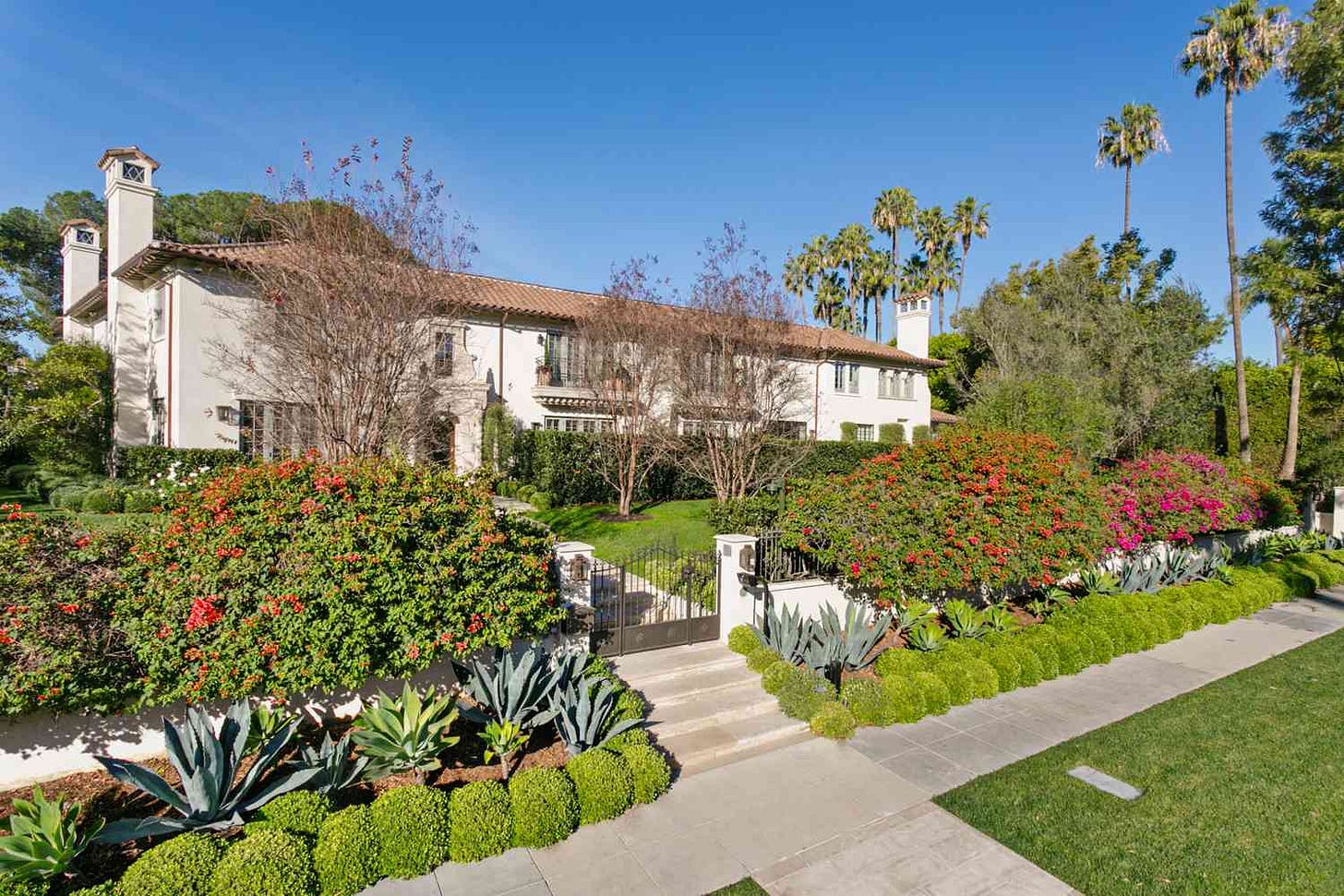Hollywood's Real Estate Romance is Over
It's not just writers. 'People don't know when they're going to be working next,' says one realtor, as entertainment buying grinds to a halt

Mention a local neighborhood to a literary-minded Angeleno and more than likely they’ll conjure an association between that zip code and a famous writer — past or present. Dennis Hopper, who notched an Academy Award nomination for co-writing Easy Rider in 1969 embodied the shaggy bohemianism of 1970’s Venice Beach where he lived for more than two decades. While she and her husband, John Gregory Dunne, may have lived for a spell on Franklin Avenue in Hollywood, Joan Didion will forever be an emeritus resident of western Malibu. Phil Rosenthal is part of the firmament of Hancock Park, and can often be seen cruising down Larchmont. Larry David has been poking fun of his Brentwood neighbors in episodes of Curb Your Enthusiasm for 11 seasons. Meanwhile, on the other side of the Sepulveda pass, Bret Easton Ellis and Paul Thomas Anderson (metaphorically speaking) are forever duking it out in the parking lot of The Galleria over who gets to claim Sherman Oaks and Encino.
It’s not just that these writers — all of whom were or are members of the WGA — were one-time residents and/or homeowners in their respective nabes. Their connections to local real estate resulted in some of the most famous representations of the city, whether in novels, essays, films or television shows, many of which became part of the collective consciousness. “A place belongs forever to whoever claims it hardest, remembers it most obsessively… loves it so radically that he remakes it in his image,” Didion wrote in The White Album. The problem with this quote is that no one told Didion about the coming real estate boom.
As it enters its 10th week, the writers strike, and potential looming SAG/AFTRA strike, have put many things about making a living as a creative person in Southern California in relief. Near the top of that list is the increasingly lopsided relationship between the industry’s creative community and L.A.’s real estate market. The outlook of first-time homeownership for a young (or even not-so-young) writer, or even finding reasonable rent, seems increasingly out of reach.
Year-over-year double-digit home price increases stretching back to the early aughts has transformed L.A.’s once semi-affordable real estate market into one of the priciest in the country. According to the real estate tracking company Redfin, L.A.’s median sales price in May was $950,000 — and that figure is down nearly 10 percent from a year ago. L.A. now ranks alongside Miami and New York as one of the most expensive real estate markets in the country. Whatever symbiosis existed between L.A.-based writers and the city they call home is at risk of being upended if it hasn’t already been ruined.
YOURS FOR $1.2 MILLION

Multiple forces are at play. Interviews with some of L.A.’s top residential real estate brokers indicates that the strike is definitely impacting a real estate market that was already contending with soaring interest rates and a lack of inventory.
“I have an Oscar-winning writer who recently moved from New York and he was planning on buying a house but now says that he needs to wait to see how long the strike will last — so he’s decided to rent,” says Douglas Elliman’s Juliette Hohnen who says that 80 percent of her clients are professionals who work in the film and television industry (she recently sold Tom Shadyac’s house for $2.65 million).
“I work with writers, directors, actors — all of them are being affected,” she says.
“I do think (the strike) is affecting things,” says Tami Pardee of Pardee Properties who notes that the number of transactions across the county have plummeted. According to data compiled by Douglas Elliman, new signed contracts in L.A. County declined 24 percent from May 2022 to May 2023 while new listings for single-family homes dipped 31 percent from May 2022 to May 2023. Pardee’s clientele is usually split 50-50 between folks who work in the entertainment industry and those who work in technology and gaming. Transactions involving the former, she says, have grinded to a halt. “There haven’t been a lot of sales that involve people in the entertainment industry but that’s across the board, not just writers,” she says. “I think there’s a solemn sense of solidarity with the writers out there right now. I get the sense that people, even if they have the means, aren’t making any big purchases that could be considered flashy.”
“Discretionary buyers are really sitting on the sidelines at the moment,” says Billy Rose, who, before he co-founded The Agency, worked as an entertainment lawyer. “It’s all of it — the strike, the interest rates, the loss of value in crypto, stocks and bonds. Don’t discount the impact of the new mansion tax,” he adds. In April, a new tax known as United to House L.A. or ULA went into effect that was designed to help fund a range of affordable housing projects to support the city's homeless community. It’s the result of a ballot measure that was approved by voters last year that applies a 4 percent levy on homes worth between $5-$10 million. Anything above that price is subject to a 5.5 percent tax. Brokers say it has resulted in sellers of those homes opting to rent or just wait, adding to even more inventory woes. “I’m just finding that people don’t know when they’re going to be working next,” says Rose, “and so they’re sitting waiting to see what life is going to be like.”
At the very least it’s clear that the strike is impacting L.A.’s real estate market in a tangential way. But the more interesting question might be how L.A.’s real estate market over the past two decades set the stage for the strike.
‘We’ve Given Up’
In 2014, Sarah Fahey was promoted from staff writer to story editor on the VH1 show Hit the Floor. With her bump in salary (coupled with the urging from her real estate broker boyfriend and now husband) she bought a small condo in Sherman Oaks. Two years later she sold it, made a tidy profit and used those proceeds to buy another condo in Toluca Lake. She was hooked and sensing an opportunity, went out and got her broker’s license. “I started telling my writer friends that this could bring you real stability. It was a side hustle, but it was more about the security it brought,” says Fahey.
She became a one-woman real estate evangelist writing newsletters about the importance of owning real estate. She hosted dinner parties for her friends — many of whom were fellow guild members — urging them to find a way to save enough to get a foothold in the market. And it worked. From 2018 to 2021 she sold homes to 22 writers in places like Inglewood, Tarzana, Highland Park, Woodland Hills and Studio City with prices that ranged from $465,000 for a condo at the low end to $1.9 million for a single family. Sure, they’re not exactly deals you’re going to read about in Dirt but they were meaningful, life-changing events for a working writer.
YOURS FOR $1.9 MILLION

Along the way Fahey noticed how the system was becoming not only expensive but rigged against a class of professionals that, at moments in their career, won’t be able to say for sure where their next paycheck would be coming from.
For the past 25 years, Nate Reger has carved out a career as a screenwriter in both television and film. In 2003, just a few years after he moved to L.A., Reger and his writing partner sold a spec script to Bill Mechanic’s Pandemonium Films right when they were starting to find consistent work on various network sitcoms. The spec script netted them a low six-figure payday which he then plunked down to purchase a three-bedroom, two-bathroom house near Larchmont. The price in 2003 was $750,000. Since then, Reger hasn’t necessarily hit it big, but he’s found consistent work on network sitcoms like Two Broke Girls and Cougar Town and he now views his home as one of the best decisions he’s made. It also comes with a touch of sympathy, because of his lucky timing, for the writers who came after him. “The real changes in the market have come from the new paradigms surrounding how expensive housing is combined with how much harder it is to make a consistent living in TV and film,” he says. “I’ve worked with a lot of writers in their mid-30s who are relatively successful and feeling like they can’t afford a house and won’t be able to for a long time.”
A RARE WRITER JACKPOT

Last year, Redfin issued a study that showed that in L.A., when the median home price was $823,500, an individual would need an annual income of $221,592 to make the numbers surrounding a mortgage work. Central to the current debate is how much can a professional screenwriter or television writer expect to make. According to a recent analysis by Variety’s Gene Maddaus, who pored over the available statistics surrounding member compensation pay, the average writer is doing about the same as they were in 1995. Average writer earnings in 2021 were around $260,000 which would put them within the homeownership range but the median pay (meaning the pay level where half of writers earn more and half earn less) tells a different story:
In 2001, median pay in film and TV was roughly the same: $108,000 in TV, $105,000 in film. By 2014, the last year available, median TV writer earnings had grown to $138,000, while median film writer pay had dropped to $77,000 (all in 2021 dollars).
“The biggest thing that I learned from when I started doing this was the lending aspect of it all,” says Fahey, noting that the typical writers’ deal structures aren’t favorable to a bank’s lending terms which puts an onus on proof of consistent, uninterrupted pay. “I’ve seen an executive producer of a cable show who was unable to qualify for a single-family home. There was a showrunner of a cable show whose income was so inconsistent because of all of the various elements that go into it — the development, shooting the pilot, waiting for the greenlight — that her payments were months apart, which disqualified her. I had another experience with a writer who sold seven shows in two years and was denied a loan for a house that was in escrow,” she says. “It’s because the numbers just don’t make sense and from a bank’s perspective it doesn’t look like a smart investment.”
For the younger writers, the notion of homeownership is starting to approach pipe-dream status. “For my generation it’s not a really a question of whether or not I can buy a house. It’s more about whether I can I afford to pay the rent,” says Liz Alper who took a break from picketing to chat with The Ankler about the centrality of cost of living to the strike. Alper who recently moved from Los Feliz to Sherman Oaks to save rent also founded the non-profit Pay Up Hollywood, which aims to shed light on pay inequities in Hollywood for assistants. “I’m lucky. I can afford my rent. To be honest the idea of buying anything in L.A. is a luxury that’s not meant for me. I’ve talked to a lot of other millennials and the conversation we are having is not even around home ownership because we’ve given up on it.”





This was fascinating. Well done.
Excellent piece!